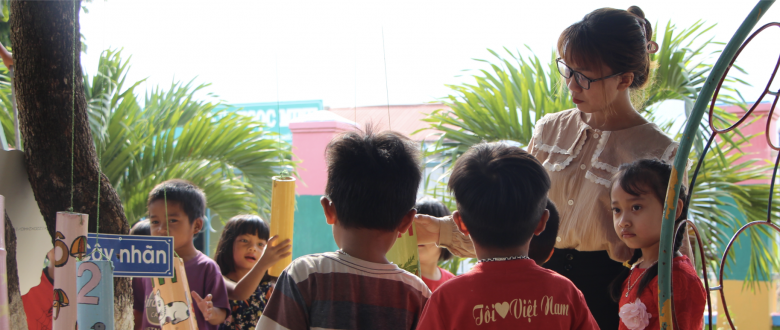
Name: Preschool Teachers Apply Language-rich Teaching Skills and Knowledge (TALK)
Location: Provinces of Điện Biên, Quảng Trị and Gia Lai
Implementation: 2022 - 2026
Donor: Belgium
Focus: Professional development of teachers and school leaders; equity
Challenges
Years spent in early childhood education (ECE) is a major predictor of better cognitive outcomes in early adolescence (Rogers, 2019). With a 99% enrolment at the age of 5 (and the ambition to extend this to the age of 4) in schools that have the facilities and the teachers to accommodate them, Vietnam has enormous potential to leverage education to truly be the ‘great equaliser’ it can be. Yet, in a context of uneven but fast economic development of Vietnam (happening mostly in the industrialised lowlands or the high-yield agriculture zones in the more accessible mountainous areas) there is a real risk that certain groups will be left behind.
Children from ethnic minority groups are particularly vulnerable and challenges in improving learning outcomes. They start school with lower average scores on the child-developmental scales and most have not yet acquired the language of instruction (Vietnamese) at the start of their school career. This creates a learning gap between non-Kinh and Kinh children which the current teaching practices are not apt to bridge by helping children from ethnic minority groups to catch up.
Goal
The programme aims to capacitate school leaders and education officers to trigger real change at the classroom level in establishing a language-rich learning environment, making sure preschools offer a better preparation for children from ethnically diverse and disadvantaged districts to enter primary school with language skills that will make them ready for learning.
Approach
The programme is designed as a triple-helix:
- Teachers have the competencies to observe wellbeing and involvement and create language-rich learning environments for preschool children in ethnically diverse and disadvantaged districts, contributing to their language development and learning.
- School leaders have the competencies to lead, capacitate and motivate their teaching staff to create language-rich learning environments for preschool children in ethnically diverse and disadvantaged districts, contributing to their language development and learning readiness
- A group of national experts from key academic institutions advocates for language-rich learning environments in combination with attention for wellbeing and involvement as an effective approach to support children's readiness for learning towards the Ministry of Education and Training (MOET) and other stakeholders, based on empirical data collected throughout the programme.
The first 2 tracks are structurally related to each other but able to advance each on their own pace at the start of the programme until concluding in a consolidated learning material that can be used for scaling the intervention. The 3rd track will follow the progress of the first two to build an evidence base, stimulating academic interest and advocating to the national level and relevant stakeholders. This approach will de-risk the implementation progress from possible delays at any specific level of the education system.
Partners
- Ministry of Education and Training
- The national Department of Teachers and Educational Administrators
- The national Early Childhood Education Department
- 3 provincial Departments of Education and Training of Điện Biên, Quảng Trị, and Gia Lai




